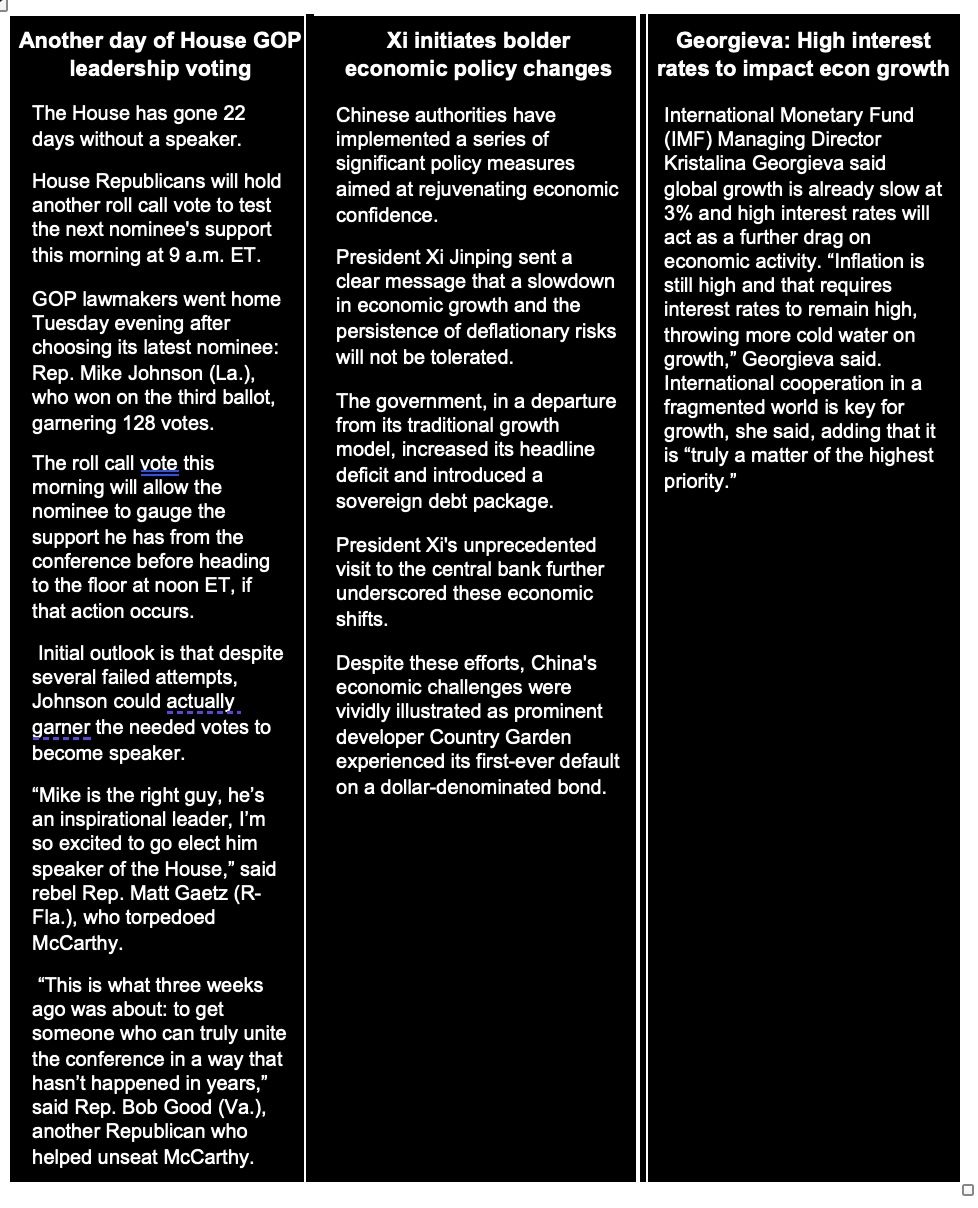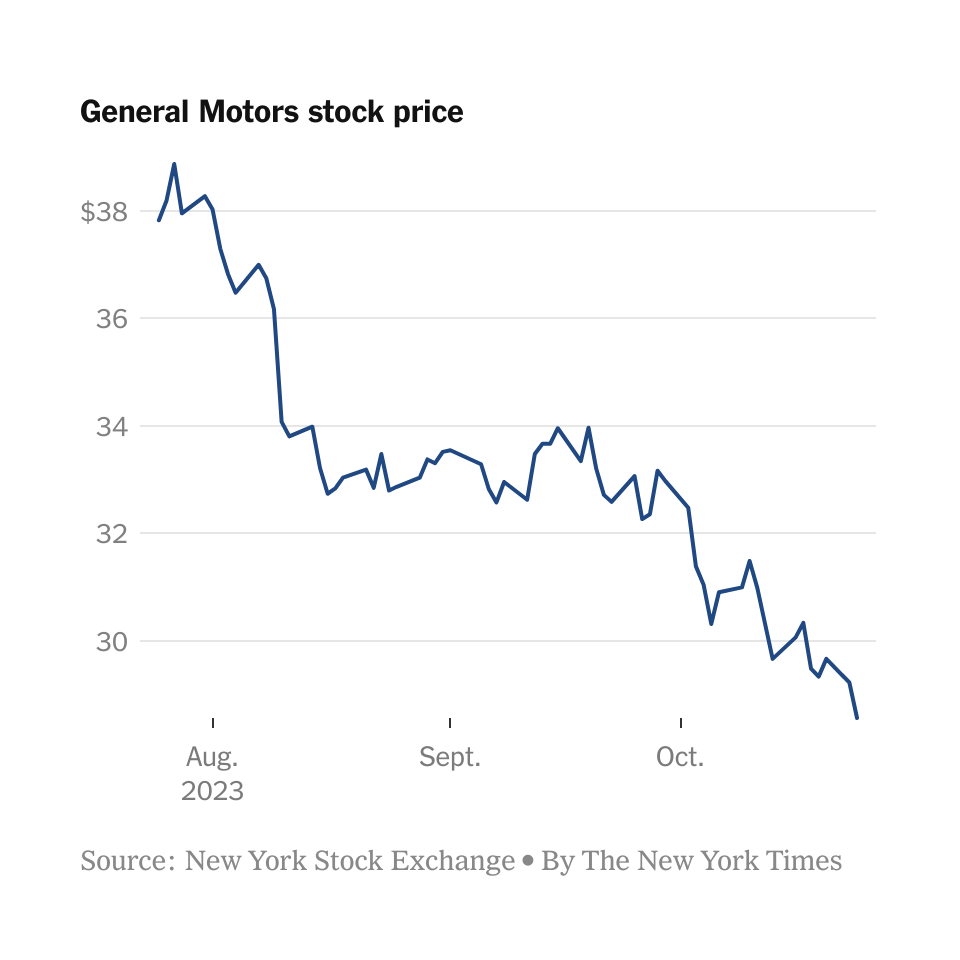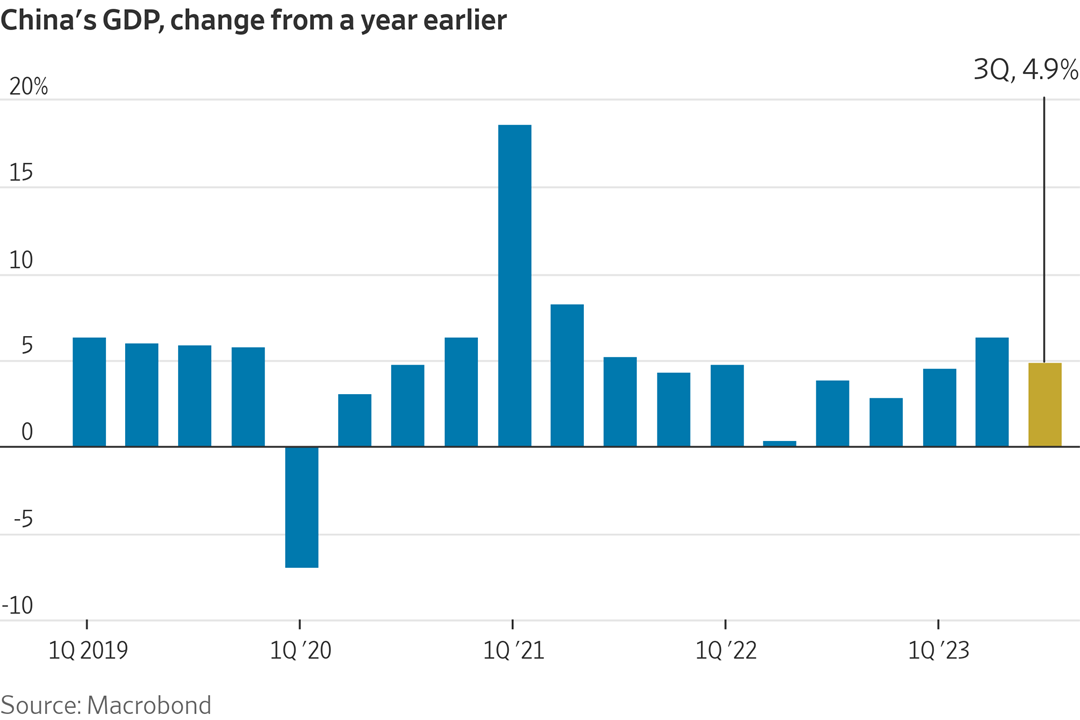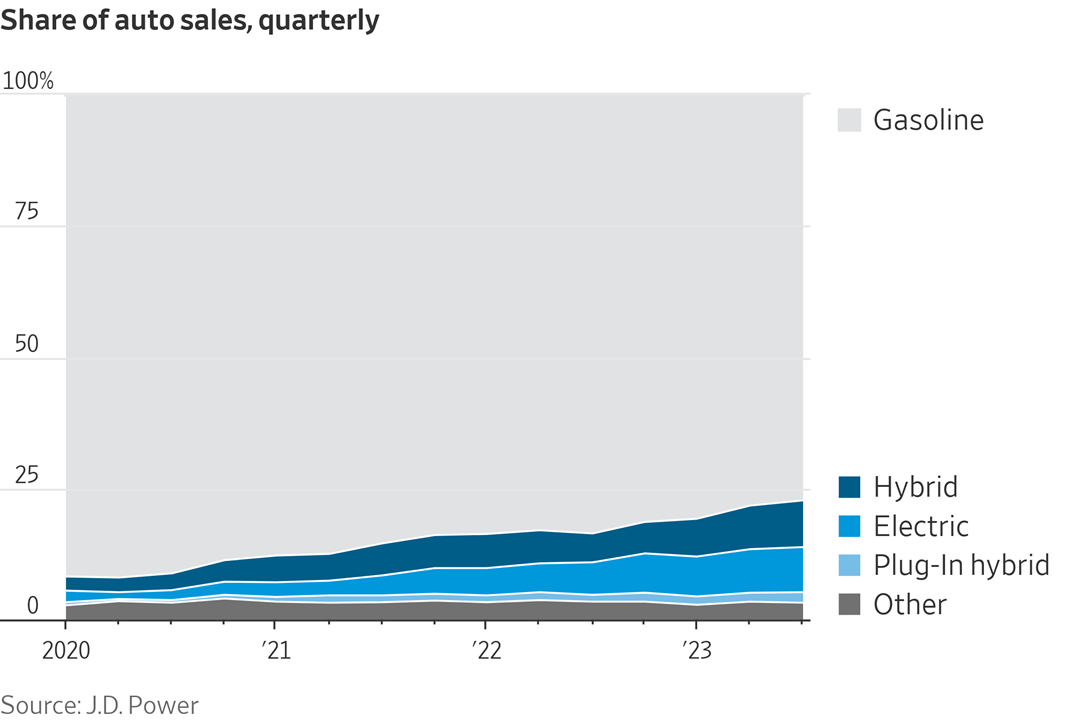Barring Another Surprise, Rep. Mike Johnson Has Votes to Become House Speaker

USDA relies on Commodity Credit Corporation funding amid farm bill uncertainty

|
Today’s Digital Newspaper |
MARKET FOCUS
- USDA daily export sale: 126,000 MT soybeans to China during 2023-2024 MY
- Iowa farmland values plateau after two years of record highs
- Bitcoin hits highest level since 2022
- UAW calls strike on one of GM’s largest and most-profitable factories
- Striking St. Lawrence Seaway workers and management to resume bargaining
- Ag markets today
- NWS weather outlook
- Pro Farmer First Thing Today items
CONGRESS
- Mike Johnson latest House speaker nominee with better chance of approval
- If Johnson is approved, big issues ahead will test his skills
- Senate poised to take up a three-bill minibus, including Agriculture
- California House Dems push farm disaster relief in supplemental request
ISRAEL/HAMAS CONFLICT
- UN Secretary-General criticizes Israel's actions in Gaza, sparks controversy
POLICY
- USDA relies on Commodity Credit Corporation funding amid farm bill uncertainty
PERSONNEL
- Jack Lew on verge of advancing confirmation as ambassador to Israel
- Senate unanimously confirms Whitaker as new FAA Administrator
- Stabenow nixes MSU chatter
CHINA
- China boosts economic stimulus
- California Governor Newsom's visit to China signals potential Xi/Biden meeting
- U.S. lawmakers urge crackdown on China's use of forced labor in seafood production
- Sen. Tim Scott proposes bill to address land purchases near sensitive locations
ENERGY & CLIMATE CHANGE
- GM abandons goal to build 400,000 electric vehicles by mid-2024
OTHER ITEMS OF NOTE
- Texas Attorney General sues Biden administration over removal of border razor wire
|
MARKET FOCUS |
— Equities today: Asian and European stocks were mixed overnight. U.S. stock indexes are pointed to mostly weaker openings. In Asia, Japan +0.7%. Hong Kong +0.6%. China +0.4%. India -0.8%. In Europe, at midday, London +0.1%. Paris -0.2%. Frankfurt -0.1%. Stocks in China rose today after Beijing announced a $137 billion stimulus plan to lift the economy.
U.S. equities yesterday: All three major indices scored gains on Tuesday. The Dow was up 204.97 points, 0.62%, at 33,141.38. The Nasdaq rose 121.55 points, 0.93%, at 13,139.87. The S&P 500 gained 30.64 points, 0.73%, at 4,247,68.
— Agriculture markets yesterday:
- Corn: December corn futures closed down 6 1/4 cents at $4.84 and nearer the session low.
- Soy complex: November soybeans rose 8 1/2 cents to $12.95 1/4, marking a high-range close above the 10-day moving average. December meal rose $13.70 to $434.20, the highest close since March 10. December soyoil fell 62 points to 51.32 cents, after trading at the lowest intraday level since June 9 earlier in the session.
- Wheat: December SRW wheat fell 6 3/4 cents to $5.80 1/2 and near mid-range. December HRW wheat lost 7 3/4 cents at $6.63 and near mid-range. December spring wheat fell 9 1/2 cents to $7.28 1/4.
- Cotton: December cotton fell 80 points to 82.93 cents, a near mid-range close.
- Cattle: Live cattle futures traded mixed Tuesday, with nearby contracts rising modestly while their deferred counterparts declined. The expiring October contract gained $1.75 cents to $180.00, while most-active December edged up 27.5 cents to $178.625. Expiring October feeder futures rebounded $1.80 to $239.425, while November fell 37.5 cents to $235.425.
- Hogs: Nearby December hog futures ended Tuesday having edged up 20 cents to $66.375, while the deferred contracts suffered moderate losses.
— Ag markets today: Corn, soybeans and wheat posted two-sided price action while holding in relatively tight trading ranges overnight. As of 7:30 a.m. ET, corn futures were trading fractionally to a penny lower, soybeans were 1 to 2 cents higher, SRW wheat futures were mostly a penny higher, HRW futures were steady to fractionally lower and HRS wheat was 5 to 7 cents higher. Front-month crude oil futures were holding near unchanged, while the U.S. dollar index was around 150 points higher.
Weaker cash cattle trade. Monday’s sharp plunge in cattle futures triggered a flurry of cash cattle sales in Iowa yesterday at lower prices. While feedlots didn’t actively move cattle in other areas of the northern market or the Southern Plains, it’s widely expected this week’s average cash price will be solidly lower than last week.
Seasonal pressure continues on cash hog fundamentals. The CME lean hog index is down another 40 cents to $78.67 (as of Oct. 23), falling to the lowest level since May 17 and now more than $16.00 below last year at this time. The pork cutout value fell $1.96 to $86.59, now more than $15.00 below last year. Until cash fundamentals stabilize, buyer interest in futures will remain limited.
— Quotes of note:
- “100% dead wrong” — Jamie Dimon, CEO, JPMorgan Chase. One of Wall Street’s most important executives says the fact that central banks were off with their financial forecasting about 18 months ago should prompt some humility about the outlook for next year.
- “One thing we are on the lookout for are instances of ‘AI washing’… Companies are claiming that a product employs AI technology when it does not.” — Tejal D. Shah, associate regional director for enforcement in the Securities and Exchange Commission’s New York office, on the regulator’s move to address a kind of false marketing similar to the better-known “greenwashing” trend.
- An auto red line. “Accepting unsustainably high costs that would put our future and the GM team members’ jobs at risk is simply something that I will not do.” — General Motors CEO Mary Barra, on the automaker’s latest offer that would pay most of its factory workers $40.39 an hour by the end of the contract term.

— DMR: Iowa farmland values plateau after two years of record highs, showing signs of stability amid challenges. Iowa's farmland values, which saw consecutive record-breaking increases for two years, are now showing signs of cooling, though they remain near historic highs. Several factors contribute to this slowdown, including drought, declining farm profits, and rising costs and interest rates, the Des Moines Register reports (link).
Despite these challenges, Iowa's farmland prices inched up by 0.6% in September compared to the previous year, as reported by the Realtors Land Institute-Iowa Chapter. Additionally, the Chicago Federal Reserve reported a 2% increase in farmland values in July year-on-year.
While the rapid, double-digit growth of the late 2020s has tapered off, experts emphasize the market's overall stability. In 2022, values surged by 10.4%, averaging $13,742 an acre, after a remarkable 43.3% increase in 2021 over the previous year. However, in the first half of this year, average farmland values dipped by 2.6% to $13,385 an acre.
Market observers note that, although record-breaking sales are not as frequent as before, they are still occurring, and farmland remains a highly sought-after commodity. Factors like strong farm profits and limited availability contribute to this market's continued strength.
However, ongoing drought conditions in Iowa and rising interest rates have affected buyers' confidence and created downward pressure on the market. The Federal Reserve has increased key interest rates significantly in an effort to combat inflation, leading to higher borrowing costs.
Despite these challenges, experts anticipate that better-than-expected yields this fall and potential supply disruptions in global markets could boost interest in Iowa farmland, potentially leading to another increase in land prices.
Additionally, Iowa's rising farmland values impact land rental costs, with rents increasing by 17% since 2020. High-quality farmland, in particular, is seeing rent rates well above the average. Despite rising input costs, interest rates, and the possibility of lower crop and livestock prices, farmers continue to view farmland as a long-term investment.
Bottom line: The optimistic outlook among farmers suggests a continued demand for farmland in Iowa, even in the face of current challenges and uncertainties. The limited availability of farmland, with some tracts not becoming available for decades, underscores the importance of seizing opportunities to acquire land for future generations.
Market perspectives:
— Outside markets: The U.S. dollar index was firmer, with the euro and British pound both weaker against the US currency. The yield on the 10-year U.S. Treasury note was higher, trading around 4.86%, with a higher tone in global government bond yields. Crude oil futures were modestly higher ahead of U.S. gov’t inventory data due later this morning, with U.S. crude around $83.95 per barrel and Brent around $87.60 per barrel. Gold and silver futures were narrowly mixed, with gold firmer around $1,986 per troy ounce and silver weaker around $22.95 per troy ounce.
— $35,000: Bitcoin on Tuesday hit its highest level since 2022. The possible approval in coming weeks of the first U.S. spot Bitcoin ETFs is raising hopes for the cryptocurrency’s fortunes.
— UAW calls strike on one of GM’s largest and most-profitable factories. The United Auto Workers (UAW) expanded its strike against Detroit’s automakers with a walkout at one of General Motors’ largest and most profitable factories, marking the second straight day of escalation by the union. The unannounced strike came one day after about 6,800 UAW workers walked out of a suburban Detroit factory where Chrysler-parent Stellantis makes Ram pickup-trucks, among the company’s most profitable and highest-selling models. The back-to-back walkouts together mark the sharpest escalation of the union’s strike since it began in mid-September.
— Striking St. Lawrence Seaway workers and management to resume bargaining, aiming to ease shipping impasse. Workers on strike at the St. Lawrence Seaway and the Canadian company overseeing the vital trade route are scheduled to return to the negotiating table, the Wall Street Journal reports (link). St. Lawrence Seaway Management has confirmed that talks with the labor union Unifor are set to take place on Friday morning, with the aim of resolving the ongoing impasse on the Canadian side of the shipping corridor. This labor dispute has resulted in the disruption of over 100 vessels' operations.
The strike, which commenced over the weekend, has had a significant impact on daily economic activity, affecting approximately $25 million worth of commerce. Much of this activity is linked to commodities that facilitate the connection between farmers and manufacturers in the U.S. Midwest and Canada with international markets. Among the key commodities transported through this system are grain and iron ore.
Background. The St. Lawrence Seaway, which relies on a series of locks between Lake Erie and Montreal, serves as a critical route connecting the Atlantic Ocean to the Great Lakes. If the strike persists, some shipping companies may explore alternative transportation options, including railroads, to mitigate disruptions in their supply chains.
— USDA daily export sale: 126,000 MT soybeans to China during 2023-2024 MY
— NWS weather outlook: Significant early season winter storm brings heavy snowfall to portions of the Northwest, Northern Rockies, and Northern Plains... ...Widespread heavy rainfall with scattered to widespread instances of flash flooding possible in the Southern Plains Wednesday... ...Much above average temperatures for eastern and central portions of the country while temperatures turn frigid in the Northern Rockies and Plains.

Items in Pro Farmer's First Thing Today include:
• Quiet, two-sided overnight grain trade
• Country Garden defaults on dollar bond for first time
• Weak Eurozone lending adds to recession fears
• India to provide fertilizer subsidy
• Cold Storage Report out this afternoon
|
CONGRESS |
— Republican infighting jeopardizes gov’t operations as House speaker stalemate persists; Mike Johnson latest nominee. House Republicans' repeated failure to elect a new speaker is raising concerns about a potential gov’t shutdown. The internal strife within the GOP has led to weeks of dysfunction, preventing the House from functioning effectively and potentially delaying important legislation.
Since Oct. 3, when rebel members of the party ousted Rep. Kevin McCarthy (R-Calif.) as speaker, the House has been largely inactive. Republicans have been unable to agree on a replacement speaker, leading to a series of unsuccessful nominations. Without a speaker, lawmakers cannot bring bills to the floor for consideration.
Tuesday’s initial nominee, Rep. Tom Emmer (R-Minn.), dropped out of the race after a short-lived nomination, driven partly by criticism from former President Donald Trump, who called him a “Globalist RINO” — short for “Republican in name only” — whose elevation would be a “tragic mistake… I have many wonderful friends wanting to be Speaker of the House, and some are truly great Warriors,” Trump wrote on Truth Social. “RINO Tom Emmer, who I do not know well, is not one of them. He never respected the Power of a Trump Endorsement, or the breadth and scope of MAGA — MAKE AMERICA GREAT AGAIN!”
House Republicans Tuesday evening nominated Rep. Mike Johnson (La.) as its latest choice for speaker and will hold another roll call vote to test the next nominee's support this morning at 9 a.m. ET. The roll call vote this morning will allow the nominee to gauge the support he has from the conference before heading to the floor, if that action occurs. The Louisiana Republican won on the third ballot, garnering 128 votes. Here are the vote totals on the ballot that elected Johnson as speaker designate: Johnson, 128; Donalds, 29; Others, 44 (43 of them for McCarthy); Present, 1. During a roll-call poll of the conference, 22 GOP lawmakers were absent.
First elected to the House in 2016, Johnson, 51, is a lawyer and former radio host who is the former chairman of the conservative Republican Study Committee. He has been the House GOP’s vice chairman, a junior leadership position, since 2021. An evangelical Christian who is a member of the Judiciary Committee, Johnson was a key architect of Republicans’ objections to certifying the victory Joe Biden on Jan. 6, 2021. Many Republicans in Congress relied on his arguments. He is an ally and former supporter of Rep. Jim Jordan (R-Ohio) as speaker. And, Johnson is a close Trump ally, having served in the former president’s legal defense team during his two impeachment trials in the Senate.
The ongoing speaker crisis has stalled policy discussions at a time when issues like the conflict in Israel and the imminent expiration of federal funding require urgent attention. Congress must approve a funding deal by Nov. 17, or there is a risk of military members missing paychecks, national parks closing, and the Internal Revenue Service operating with limited resources.
The longer the impasse continues, the more likely it becomes that the GOP will shoulder the blame for a potential government shutdown.
Senate business, under Democratic control, continues despite the House's issues, with lawmakers working on longer-term spending bills and supporting short-term measures to keep the government funded at current levels.
There are disagreements over interim solutions. The House had considered granting expanded powers to Rep. Patrick McHenry (R-N.C.) to bring legislation to the floor, but this plan faced opposition. Some lawmakers argued that McHenry already had the authority to do so without additional powers.
The ongoing speaker issue has implications for gov’t funding. Hard-line Republicans, especially within the House Freedom Caucus, oppose short-term funding measures and prefer full-year appropriations bills. But the House has only passed four appropriations bills, all at lower spending levels than previously agreed upon. With insufficient time to pass the remaining eight bills and reconcile them with the Senate, passing another short-term funding bill with Democratic support appears to be the only way to avert a government shutdown.
While some Republicans fret the idea of relying on Democratic votes to elect a speaker or legislate, others see it as a pragmatic approach to move forward. The uncertainty surrounding this situation underscores the challenges facing the GOP and the potential consequences of their internal divisions.
Bottom line: The initial assessment is Johnson just may have the votes to finally end the leadership saga, largely due to the lack of vocal opposition. “The clock is ticking every day, and they don’t have near enough time. And it doesn’t even matter who wins the speakership because the caucus is just ungovernable right now,” said Doug Holtz-Eakin, president of the American Action Forum, a conservative-leaning group. “There’s very good reason to be nervous about a shutdown. The odds are increasing.”
Of note: If the optimistic tone about Johnson actually garnering the needed votes to become speaker, moderate Republicans will seek a deal with House Democrats to end the saga.
— The Senate is poised to take up a three-bill minibus, including Agriculture, with some 40 amendments teed up for floor action starting as soon as today. The measure includes the Senate’s Agriculture-FDA, Military Construction-VA, and Transportation-HUD spending bills (HR 4366). It totals $279.3 billion, about 17% of overall discretionary spending.
Senators agreed to allow votes on 40 amendments, though they can batch some together in “en bloc” votes, rather than dealing with each one individually. That includes 34 measures set at a simple-majority threshold and six that would need 60 votes to be adopted.
The amendment list includes measures to:
- Bar funding for Covid-19 mask mandates on public transportation (requiring a simple majority)
- Block all earmarks in the bill (simple majority)
- Bar any funding for Chinese entities (simple majority)
- Bar funding for the salary of Ann Carlson, acting administrator of the National Highway Traffic Safety Administration (simple majority)
- Bar funding for drones linked to China, Russia, Iran, North Korea, Venezuela, or Cuba (simple majority)
- Audit the Federal Reserve (requiring 60 votes)
- Automatically appropriate funds at the previous fiscal year’s level in the event of a funding lapse, ending the possibility of shutdowns (60 votes)
- Sens. Marco Rubio (R-Fla.) and Rick Scott (R-Fla.) will get a vote on a bill to approve block grant relief authority to the Agriculture Secretary, for use in response to hurricanes in Florida.
- Senate Ag Chair Debbie Stabenow’s (D-Mich.) amendment to restore funding to USDA’s urban agriculture office will be considered.
- Sen. Tina Smith’s (D-Minn.) amendment to mandate USDA to issue a report on improving staffing at the Farm Service Agency and Natural Resources Conservation Service will also receive a vote.
— California House Democrats urge Biden administration to include farm disaster relief in domestic priorities supplemental request. California Democratic Representatives Salud Carbajal, Julia Brownley, Jim Costa, Zoe Lofgren, and Jimmy Panetta have called on the Biden administration to allocate disaster relief funding for California farmers and growers in an upcoming supplemental request for domestic priorities. In a letter (link) addressed to Office of Management and Budget Director Shalanda Young, the lawmakers emphasized the urgency of federal aid for the agricultural community to support a swift and complete recovery. They highlighted the severe impact of atmospheric storms earlier in the year, which led to intense rainfall and catastrophic flooding. These events delayed planting schedules, saturated fields, and caused damage to crops, making the recovery process more challenging. The representatives underscored the significance of this assistance to ensure the continued production of fruits and vegetables, which has broader implications for the nation's food supply.
Of note: The Washington Post reported the White House is considering a roughly $50 billion proposal for the supplemental spending request, citing two people familiar with the matter. A White House fact sheet published Friday said in “the coming days,” the administration will send a request for “funds to address recent natural disasters, avoid the risk that millions of Americans lose access to affordable high-speed internet or child care, provide additional resources for FEMA’s Nonprofit Security Grant Program, and avert a funding cliff for wildland firefighter pay.” Congress should also provide funding for the Special Supplemental Nutrition Program for Women, Infants, and Children, the fact sheet said.
|
ISRAEL/HAMAS CONFLICT |
— UN Secretary-General criticizes Israel's actions in Gaza as 'collective punishment,' sparks controversy. United Nations Secretary-General António Guterres condemned Israel's siege and bombing of Gaza, characterizing it as "collective punishment" against the Palestinian people and a breach of humanitarian law. In response, Israel vehemently rejected Guterres' statement, with its envoy to the UN even calling for his resignation, accusing him of justifying Hamas's "terrorism and murder."
Meanwhile, both the United States and Russia called for a temporary ceasefire in the conflict to facilitate the delivery of humanitarian aid to the Gaza Strip. However, only eight aid trucks managed to enter Gaza from Egypt on Tuesday. No specific reason was given as to why the other 12 trucks didn't make it. The UN reported that over a third of Gaza's hospitals had closed due to damage or a lack of fuel, further worsening the crisis. Additionally, the UN also criticized Hamas for its use of human shields during the ongoing conflict.
|
POLICY UPDATE |
— USDA relies on Commodity Credit Corporation funding amid farm bill uncertainty. USDA Secretary Tom Vilsack on Tuesday highlighted the challenges facing the ag industry due to the lack of a new farm bill, budget uncertainty, and the absence of a House speaker. With these uncertainties looming, Vilsack noted that the possibility of a farm bill extension becomes more likely the longer the situation persists.
To address these challenges, Vilsack revealed that USDA will utilize funds from the Commodity Credit Corporation (CCC). The $2.3 billion in CCC funding from the last fiscal year will be directed towards boosting international markets for farmers, with a particular focus on specialty crop producers, many of whom operate small and mid-sized farms. High-value products like wine and whiskey will also benefit from this funding.
Additionally, $100 million will be allocated to address phytosanitary and technical trade barriers for specialty crops.
Vilsack expects this funding to be utilized over several years. He explained that the funds will not be required to be spent within a single fiscal year but will remain available until fully utilized. USDA aims to establish regulations for the programs by the end of 2023 or early 2024. Furthermore, USDA plans to allocate $1 billion for international food aid, with the specifics of where the funds will be directed left to USAID's discretion to determine where they are most needed.
To address the fiscal year 2023 agricultural trade deficit of $19 billion, which is projected to grow to $27.5 billion in fiscal year 2024, $1.3 billion will be allocated to create the Regional Agricultural Promotion Program (RAPP). RAPP will facilitate market access for exporters in both new and growth markets. It will be available to cooperators who currently receive funding from the Foreign Market Development program (FMD) and the Market Access Program (MAP). While FMD and MAP will continue to operate under appropriations, CCC funds cannot directly support these programs due to federal law restrictions.
Farm groups have welcomed this move, emphasizing the importance of export market development programs in increasing farm income. However, they also stressed that while this funding is beneficial, Congress needs to take further action, including increasing long-term funding for programs like the Market Access Program (MAP) and Foreign Market Development Program (FMD) in the next farm bill. Farming organizations believe that these programs are essential for expanding exports and ensuring the competitiveness of American agriculture in global markets.
|
PERSONNEL |
— Jack Lew is on the verge of advancing his confirmation as the ambassador to Israel, with a favorable report anticipated from the Senate Foreign Relations Committee's 10 a.m. ET meeting. Nevertheless, the vote is expected to split along party lines, as Republican senators strongly oppose Lew's previous role as Treasury secretary in the Obama administration due to his involvement in negotiating the Iran nuclear deal.
— Senate unanimously confirms Mike Whitaker as new FAA Administrator after 18-month vacancy. The Senate confirmed Mike Whitaker as the administrator of the Federal Aviation Administration (FAA) with a unanimous vote of 98-0. This appointment fills a position that had remained vacant for 18 months. Whitaker assumes the role after the initial nominee by the Biden administration, Phil Washington, withdrew his nomination in March due to Republican opposition, which indicated that he would not secure full confirmation. As the newly appointed FAA administrator, one of Whitaker's initial challenges will be addressing the issue of pilot training, among other responsibilities within the aviation regulatory agency.
— Stabenow nixes MSU chatter. Senate Ag Chairwoman Debbie Stabenow (D-Mich.) said, "Not going to happen!" to speculation that she would leave the Senate to chair the Michigan State University board.
|
CHINA UPDATE |
— China boosts economic stimulus efforts with increased sovereign bond issuance and budget-deficit target. China intensified its economic stimulus efforts by issuing additional sovereign bonds and raising its budget-deficit target outside of the regular legislative session, marking the first such move in over a decade. The country's top legislative body recently approved a plan to raise 1 trillion yuan, roughly equivalent to $137 billion, in additional sovereign debt, as reported by the official Xinhua News Agency. This latest stimulus initiative comes in the wake of several smaller measures, including interest-rate cuts and reduced mortgage costs for homebuyers. It underscores Beijing's ongoing concerns about the strength of the economic recovery, which it had anticipated would be robust after lifting all pandemic-related restrictions.


— California Governor Newsom's visit to China signals potential Xi/Biden meeting amid improved U.S./China relations. California Governor Gavin Newsom's visit to China, including meetings with President Xi Jinping and Foreign Minister Wang Yi, serves as a significant indicator of the possibility of a meeting between Xi and President Joe Biden next month during the Apec summit in San Francisco. U.S.-China relations have shown signs of stabilization in recent months.
Newsom, known for his advocacy of ambitious climate policies, arrived in China after touring various cities, focusing on climate change collaboration and discussions on clean energy transition, economic growth, and climate crisis mitigation. His visit aims to strengthen ties between the world's two largest economies, with a particular focus on climate issues.
Of note: Governor Newsom's visit highlights California's substantial Chinese-American population. It is expected that agreements will be signed with provincial leaders during his visit to China.
— U.S. lawmakers urge crackdown on China's use of forced labor in seafood production. U.S. lawmakers are calling on the Biden administration to take action against China's employment of forced labor in seafood production. This appeal follows an investigative report by The Outlaw Ocean Project, a nonprofit journalism organization, which revealed widespread instances of laborers being transferred from China's Xinjiang region to seafood-processing facilities in other parts of the country.
In a letter addressed to Department of Homeland Security Secretary Alejandro Mayorkas, Rep. Chris Smith (R-N.J.) and Sen. Jeff Merkley (D-Ore.), who lead the Congressional-Executive Commission on China, recommended that the administration block imports from seafood-processing facilities in China that violate a U.S. law designed to target forced labor associated with Xinjiang. Xinjiang is home to the Uyghur people and other minority groups, and allegations of human rights abuses have led to increased scrutiny.
Of note: China holds the position of the world's largest seafood producer, with an estimated production of 67.5 million metric tons in 2022, according to USDA. This call for action is part of a broader effort to investigate and address supply chain connections between businesses and China, particularly in the context of the enforcement of laws aimed at blocking imports from Xinjiang, where allegations of human rights violations have been prominent.
— Sen. Tim Scott proposes bill to address land purchases near sensitive locations amid U.S./China tensions. Land purchases in the United States by companies potentially connected to the Chinese Communist Party have raised concerns and tension between the U.S. and China. Recent incidents, such as a Chinese-owned Bitcoin-mining center near a Wyoming Air Force base, have heightened worries about the acquisition of American farmland by entities with ties to Beijing.
In response, Sen. Tim Scott (R-S.C.), a prospective 2024 presidential candidate, introduced a bill aimed at addressing perceived flaws in the review process. The proposed legislation would require federal agencies to maintain a list of sensitive locations, which would then be shared with the Committee on Foreign Investment in the United States (CFIUS). CFIUS has faced challenges in the past due to bureaucratic issues, leading to concerns that sensitive land purchases were slipping through the review process. The committee cited a lack of jurisdiction in the case of a land purchase near a North Dakota Air Force base by the Chinese food company Fufeng Group because the Defense Department had not identified the area as sensitive.
Sen. Scott's bill aims to ensure that foreign adversaries cannot establish a presence in these sensitive locations by mandating that federal agencies provide information to CFIUS. The Treasury Department, responsible for overseeing CFIUS, is also working on addressing the issue by proposing a rule to include certain military installations within the committee's jurisdiction.
States have taken independent actions to address this issue, with Grand Forks terminating a land deal involving a Chinese company due to national security concerns. Additionally, state lawmakers in various parts of the country have introduced bills to restrict foreign ownership of land near military bases. Arkansas recently ordered a state-controlled Chinese seed company to sell land and pay penalties under a new law targeting "prohibited foreign party-controlled" land, citing concerns about protecting U.S. intellectual property, including in the realm of seeds and technology. Asked why the purchase posed a risk to U.S. intellectual property, Gov. Sarah Huckabee Sanders said, “Seeds are technology.”
|
ENERGY & CLIMATE CHANGE |
— General Motors shifts electric vehicle strategy amid buyer hesitation, abandoning 400,000 EV target. General Motors made an unexpected decision to abandon its previously set goal of manufacturing 400,000 electric vehicles (EVs) by mid-2024. This move underscores the growing concerns among automakers regarding the market's sustainability for battery-powered cars. GM's shift in focus on EVs comes as a surprise, given the company's prior commitment to the technology, banking on its potential to eventually replace gasoline-powered vehicles in the coming decade. This decision aligns with concerns expressed by rivals such as Tesla and Ford Motor, who have also voiced doubts about consumer demand for EVs and their willingness to pay a premium for them compared to traditional models. Link to more via the Wall Street Journal.

|
OTHER ITEMS OF NOTE |
— Texas Attorney General sues Biden administration over removal of border razor wire, citing security concerns. Texas Attorney General Ken Paxton filed a lawsuit against the Biden administration, alleging that federal agents initiated a policy in late September to remove razor wire from the U.S./Mexico border. Paxton claims that this policy decision has undermined the state's border security efforts. The lawsuit, filed in the Western District of Texas, is the latest development in an ongoing legal battle between the state of Texas and the Biden administration regarding border security amid a significant migration surge that is placing strain on both local and federal resources.
Of note: During the previous month, Border Patrol agents apprehended over 200,000 migrants crossing the U.S./Mexico border, marking the highest monthly total for this year.
|
KEY LINKS |
WASDE | Crop Production | USDA weekly reports | Crop Progress | Food prices | Farm income | Export Sales weekly | ERP dashboard | California phase-out of gas-powered vehicles | RFS | IRA: Biofuels | IRA: Ag | Student loan forgiveness | Russia/Ukraine war, lessons learned | Russia/Ukraine war timeline | Election predictions: Split-ticket | Congress to-do list | SCOTUS on WOTUS | SCOTUS on Prop 12 pork | New farm bill primer | China outlook | Omnibus spending package | Gov’t payments to farmers by program | Farmer working capital | USDA ag outlook forum | Debt-limit/budget package |






